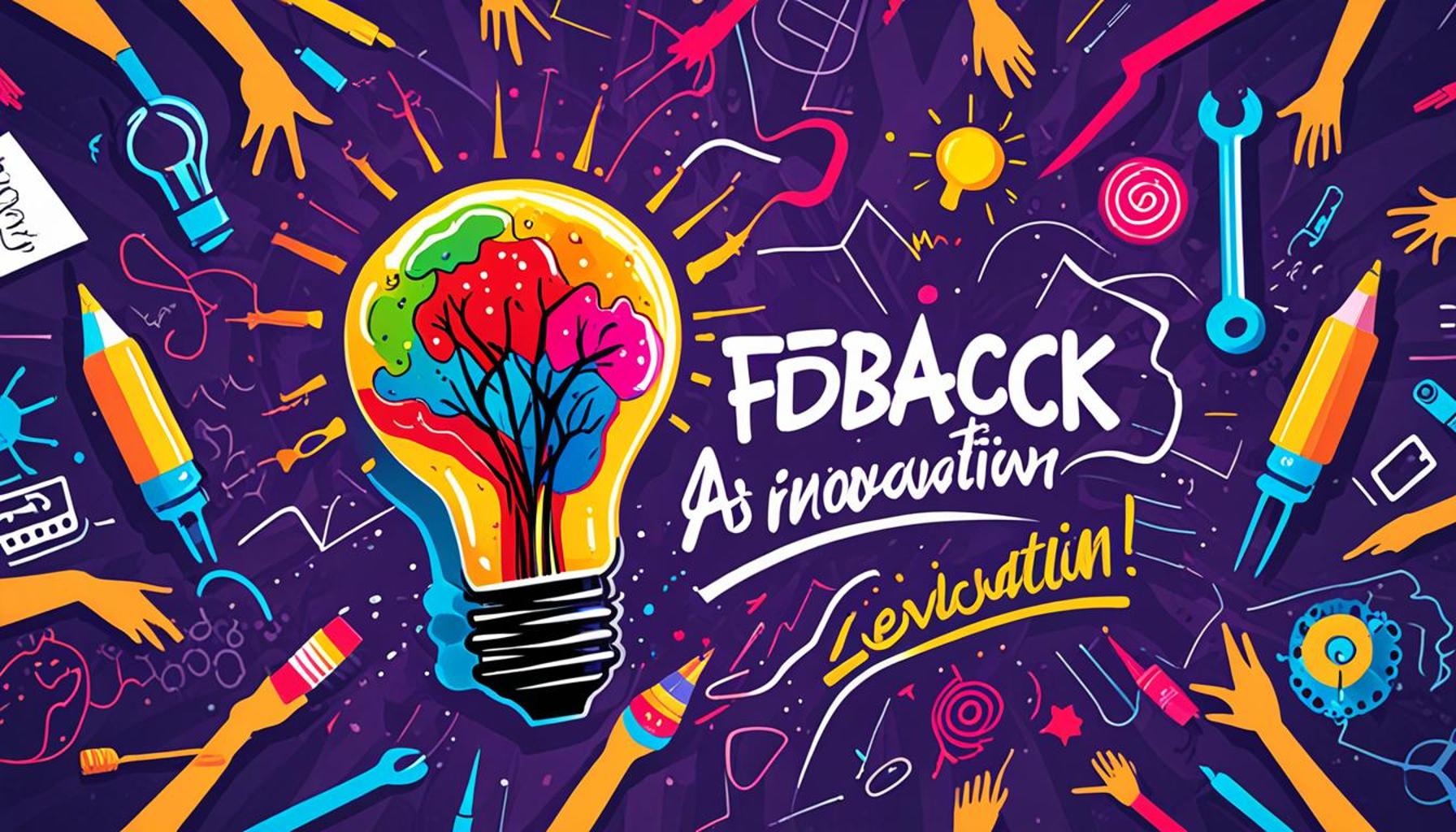How to Cultivate Resilience Through Feedback: Lessons on Personal Growth

Understanding Resilience and Feedback
In today’s fast-paced world, the ability to bounce back from setbacks is more crucial than ever. Resilience is not just about enduring difficulties; it’s about thriving amid challenges. Feedback plays a pivotal role in fostering this essential trait. Individuals and communities who effectively utilize feedback can adapt more readily to changing circumstances and emerge stronger.
Why is feedback essential for personal growth? Here are a few reasons:
- Insightful Perspectives: Constructive criticism helps identify blind spots. When you receive feedback from peers, mentors, or even family, it can illuminate areas in your life that may need attention. For instance, a student in Nigeria who receives feedback on their academic performance can better understand their weaknesses in specific subjects, allowing them to focus their studies effectively.
- Continuous Improvement: Feedback promotes a cycle of learning and adaptation. When individuals embrace feedback, they engage in a process of continual learning. In a rapidly changing job market, especially in Nigeria where sectors such as technology and entrepreneurship are evolving, being open to feedback can enhance one’s skill set and adaptability.
- Stronger Connections: Engaging with others leads to collaborative resilience. In Nigerian communities, where collective efforts often yield greater results, feedback facilitates open dialogue and collaboration. By discussing challenges and encouraging one another, individuals can create a support system that fosters resilience.
For many Nigerians, navigating life’s hurdles—from job markets to community dynamics—demands a robust support system and a positive mindset. Resilience can be cultivated, and feedback is that crucial first step. It is important to recognize that feedback can come in various forms, whether through formal evaluations in the workplace or informal conversations with friends and family.
This article delves into strategies for harnessing feedback as a tool for enhancing resilience. By exploring practical examples and case studies, readers will discover how to embrace criticism and use it for personal development. For instance, small business owners who actively seek customer feedback can adapt their services to better meet community needs, ultimately building a more resilient enterprise.
Are you ready to explore the transformative power of feedback? It can turn difficulties into opportunities for growth. Recognizing the importance of feedback, you’ll gain insight into leveraging it for self-improvement, helping navigate life’s challenges, and fostering a resilient mindset. Let’s dive into the lessons that can lead to profound personal growth and resilience.

RECOMMENDED: Check out this similar article
The Power of Embracing Feedback
Feedback is often viewed with trepidation, but it holds the key to unlocking resilience. Embracing feedback entails not only receiving criticism but also interpreting it as a vehicle for personal growth and self-improvement. In the Nigerian context, this is particularly relevant, as people frequently encounter various challenges—from academic hurdles to business setbacks. Learning how to effectively integrate feedback into one’s life can cultivate a stronger, more versatile character capable of navigating these difficulties.
One of the first steps in harnessing the power of feedback is to develop a mindset that views criticism as a stepping stone rather than a stumbling block. The significance of adopting this perspective cannot be overstated. When individuals harbor a growth mindset—a term popularized by psychologist Carol Dweck—they are more likely to see feedback as an opportunity for development. In Nigeria, this shift can lead to positive transformations, especially in fields such as education and entrepreneurship. Instead of taking criticism personally, aspiring professionals can learn to separate their identity from their work, allowing for constructive input without damaging their self-esteem.
To effectively cultivate resilience through feedback, consider the following strategies:
- Active Listening: Engaging fully when receiving feedback is essential. This means not just hearing what others are saying but also reflecting on their comments. When a teacher points out areas where a student can improve, the student should not only listen but critically assess how they can implement those suggestions in their studies.
- Seeking Diverse Opinions: Feedback can come from various sources—coworkers, friends, mentors, and even family members. Actively seeking out differing perspectives can provide a more rounded view of one’s strengths and weaknesses. For instance, a budding entrepreneur in Nigeria might gain invaluable insights from both customers and experienced business owners.
- Setting Actionable Goals: It is crucial to turn feedback into actionable goals. After reflecting on the feedback received, individuals should set specific objectives to enhance their skills or address the areas highlighted. For example, a student might aim to spend an extra hour each week on a challenging subject highlighted by a teacher.
Moreover, resilience thrives in a community that supports open discussions about experiences, failures, and triumphs. In Nigeria, where communal ties are strong, connecting with others and sharing feedback can strengthen not only individual resilience but also collective problem-solving capabilities. Parents and teachers can play a pivotal role in creating environments where constructive feedback is encouraged, leading to growth for both young people and adults.
The act of integrating feedback into daily life not only hones individual skills but also fosters connections with others. As we delve deeper into the realms of resilience in the following sections, we will explore how the act of exchanging feedback serves as a catalyst for personal growth, paving the way for a more resilient generation. Are you prepared to transform your approach to feedback and, ultimately, your life? Let’s continue this journey together.
| Category | Insights |
|---|---|
| Emotional Intelligence | Cultivating resilience is closely tied to understanding and managing emotions. Feedback fosters self-awareness and enhances emotional intelligence, allowing individuals to respond better to challenges. |
| Growth Mindset | Regular feedback encourages a growth mindset, where individuals view challenges as opportunities for improvement, rather than setbacks. This approach builds fortitude and adaptability over time. |
| Support Networks | Engaging with peers or mentors who provide constructive feedback creates strong support networks, critical for thriving through adversity. These relationships foster a sense of belonging and encouragement. |
| Resilience Training | Participating in workshops or programs that focus on feedback and resilience can enhance skills over time, solidifying the ability to absorb and utilize criticism positively. |
Embracing feedback is not merely an act of receiving criticism; it is a transformative journey towards personal growth and resilience. By exploring and understanding the various facets of feedback, such as the impact on emotional intelligence and the cultivation of a growth mindset, individuals can harness these lessons to fortify themselves against life’s challenges. The essence of resilience lies in the ability to adapt, learn, and thrive through experiences, making the process of feedback an essential element in the journey of personal development. The connections forged through supportive networks and structured resilience training can empower individuals to see feedback as a tool for continuous improvement, rather than a source of fear or negativity.
ADDITIONAL INSIGHTS: Expand your understanding here
Transformative Learning Through Constructive Criticism
The journey of cultivating resilience through feedback is grounded in the ability to transform words of criticism into powerful learning experiences. This transformation is essential, especially in a dynamic landscape like Nigeria, where individuals must adapt to continuously evolving circumstances in their personal and professional lives. Research has shown that individuals who actively embrace constructive criticism engage more meaningfully in their learning processes, ultimately enhancing their resilience.
One pivotal approach to fostering resilience is to create a feedback culture. In corporate environments, for instance, implementing regular feedback sessions can demystify criticism and encourage a more collaborative atmosphere. Nigerian companies that prioritize feedback loops have observed increased employee morale and productivity. By normalizing constructive conversations, businesses can empower their teams to bounce back from failures, thereby building a more resilient workforce.
Furthermore, youth programs across Nigeria can benefit immensely from embedding feedback as a key pillar in their educational frameworks. Programs that encourage peer-to-peer feedback not only enhance communication skills but also build a sense of camaraderie among young people, making them more adaptable in social situations. For example, student groups can utilize peer review sessions in which they constructively critique each other’s work, fostering resilience by teaching them how to navigate differing opinions and perspectives.
Another significant avenue for building resilience through feedback is the incorporation of reflective practices. This can be as simple as maintaining a feedback journal where individuals record insights gained from various feedback sources—be it from mentors, professors, or colleagues. Reflecting upon these insights allows individuals to critically assess their growth areas and recognize the patterns of their responses to criticism. In the context of Nigeria, this practice can promote a heightened self-awareness that is essential for personal development and resilience.
Moreover, establishing a strong support system is crucial. When individuals surround themselves with friends, mentors, and peers who are committed to providing honest, supportive feedback, they are more likely to view challenges as opportunities rather than obstacles. A community that fosters open dialogue about feedback not only builds collective resilience but also prepares individuals to face external challenges with confidence. In various Nigerian communities, the role of elders and experienced professionals in guiding the younger generation can significantly enhance this culture of constructive criticism and support.
In addition, the importance of emotional intelligence in receiving feedback cannot be overstated. By developing skills to manage emotions during feedback sessions, individuals learn to focus on the content of the message rather than the delivery. This can be particularly impactful for Nigerians who may frequently encounter interpersonal challenges in diverse workplaces. Emotional intelligence equips individuals with the resilience to navigate critical commentary without internalizing it as a personal failure.
As we continue to unpack the relationship between feedback and personal growth, it is essential to recognize these multifaceted strategies that promote resilience. By integrating feedback into daily practices, individuals are not only sharpening their skills but also honing their capacity to adapt, thrive, and inspire others in their communities. So, what feedback will you embrace today to foster your own resilience?
RECOMMENDED: Check out this similar article
Embracing the Power of Feedback for Resilience and Growth
In conclusion, the journey to cultivating resilience through feedback is not merely a process but a transformative experience that shapes individuals towards personal growth. By embracing constructive criticism, we open ourselves to a world of opportunities to learn and innovate. The strategies discussed in this article—from establishing a robust feedback culture in workplaces to fostering peer support systems in educational environments—are pivotal in enhancing resilience in our fast-changing Nigerian landscape.
As we reflect on the multifaceted nature of feedback, it becomes clear that it is a tool for empowerment rather than a hindrance. The importance of emotional intelligence cannot be overlooked; managing our emotional responses allows us to absorb feedback constructively, turning what could be perceived as defeat into a fruitful avenue for growth. By recording reflections and insights gained from feedback, we not only track our progress but also cultivate self-awareness, essential for personal development.
This intricate tapestry of feedback, support, and emotional intelligence weaves together a resilient foundation that equips individuals to face challenges head-on. It is paramount that as a society, we continue to foster an environment where feedback is viewed as a mechanism for improvement rather than criticism. As we commit to embracing the lessons feedback brings, we pave the way for a more resilient community capable of inspiring change and overcoming adversity.
Ultimately, the question remains: what steps will you take today to harness the power of feedback in your own life? As we venture forth, let us value each insight as a stepping stone to greater resilience and personal growth.


